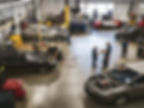Catalytic Converter Repair

Do You Need Catalytic Converter Repair or Replacement?

Common Signs of Catalytic Converter Repair
Common Causes of Catalytic Converter Failure
Book Your Catalytic Converter Inspection Today

📍 Local Catalytic Converter Repair


⚑ Close to Steeles Ave & Torbram Rd Brampton, ON L6T 1A7
✰✰✰✰✰4.8 star rating

⚑ Just off Appleby Line & Corporate Dr Burlington, ON L7L 5T9
✰✰✰✰✰4.9 star rating

⚑ Nearby Burnhamthorpe Rd & Kipling Ave Etobicoke, ON M8Z 2X3
✰✰✰✰✰4.8 star rating

⚑ Near Mohawk Rd & Upper Sherman Ave Hamilton, ON L8V 4G7
✰✰✰✰✰4.6 star rating

⚑ Near Matheson Blvd & Hurontario St Mississauga, ON L4Z 2Y5
✰✰✰✰✰4.4 star rating

⚑ Close to Finch Ave & Weston Rd North York, ON M9M 2Y3
✰✰✰✰✰4.5 star rating

⚑ Right by Howard Park Ave & Bloor St Toronto, ON M6R 1V5
✰✰✰✰✰4.7 star rating
💬 Catalytic Service: FAQs

How long do catalytic converters last?

Catalytic converters generally last 10 to 15 years, but their lifespan depends on driving conditions and maintenance habits.
Can a clogged catalytic converter damage my engine?

Yes, if not addressed, a clogged catalytic converter can cause backpressure in the engine, leading to overheating and engine damage.
Can a catalytic converter be cleaned instead of replaced?

In some cases, a catalytic converter can be cleaned using special solvents, but if it's severely damaged or clogged, replacement is usually necessary.
Will a bad catalytic converter trigger my engine light?

Yes. Your vehicle’s onboard computer will detect issues with exhaust gases and activate the check engine light if the catalytic converter is failing.
How much does a catalytic converter replacement cost?

The cost of catalytic converter replacement can vary based on several factors, including your vehicle's make and model, the type of converter required (OEM vs. aftermarket), and labor costs. Here’s a breakdown:
Estimated Cost for Catalytic Converter Replacement:
Economy/Compact Cars (e.g., Honda Civic, Toyota Corolla):$500 to $1,500 (parts + labor)
Midsize Vehicles (e.g., Honda Accord, Toyota Camry):$700 to $2,000 (parts + labor)
SUVs and Trucks (e.g., Ford F-150, Chevy Silverado, Jeep Grand Cherokee):$1,000 to $3,000 (parts + labor)
Luxury/High-Performance Cars (e.g., BMW 3 Series, Audi A4, Mercedes-Benz):$2,000 to $4,500 (parts + labor)
Is it safe to drive with a bad catalytic converter?

Driving with a bad catalytic converter is not recommended, as it can cause engine damage and significantly affect performance.


